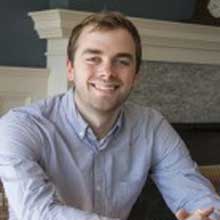When people are hungry they look for food, but what happens to microorganisms in the ocean when they get hungry? Do they perish, live or grow? Sean Anderson answered those questions researching the feeding habits of heterotrophic protists—microscopic ocean plankton that are a critical link in the ocean food web.
Working with Professor Susanne Menden-Deuer at the URI Graduate School of Oceanography, Sean wondered what happens when the heterotroph’s preferred prey, phytoplankton, are in short supply. He said the heterotrophs can face long periods of starvation, especially in the winter when there are few phytoplankton around. So he examined how long the organisms could go without food, and how long it took them to resume feeding once phytoplankton were found again.
“Any shifts in the balance between predator and prey in the ocean ecosystem are crucial for scientists to study,’’ Sean said. “My results are important for projecting plankton feeding and growth down the road, especially in the face of climate change.’’
Sean found time during his first semester on campus for the trip of a lifetime, a research expedition to Antarctica to study the eating habits of krill. “It was amazing,’’ he said. “It was unlike anything I’d ever seen before—giant glaciers, mountains, penguins. The air was incredibly clean. You could see for miles.’’
Since graduating in May, Sean is continuing to work in Professor Menden-Deuer’s lab to prepare his research for publication. “I never thought I’d be so captivated by things I can’t see with the naked eye,’’ he said. “I even have dreams about plankton. It’s truly become my obsession.’’

